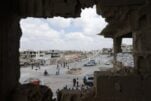
The number of migrant workers in the Middle East and North Africa region in 2019 reached about 49 million, according to United Nations estimates. Saudi Arabia alone accounted for about 13 million expatriates. An increase of 2 million expatriates compared to 2017.
Migrant labour is a basic component of the demographics in the Arab/Persian Gulf countries. In particular, since the oil boom began to reach high levels in the 1970s. According to government sources, the expatriates in the Gulf/Persian Cooperation Council in 2018 made up 88.53% of the total population in the United Arab Emirates:
87.3% in Qatar
69.65% in the State of Kuwait
54.11% in the Kingdom of Bahrain
43.95% in the Sultanate of Oman
37.84% of the total population of the Kingdom of Saudi Arabia.
Migrant Workers from Asia
The Gulf states employ armies of workers, mostly from Asia. Mostly from India, Bangladesh, Pakistan, and Nepal. Labour used to build megaprojects and the emergence of the modern Gulf state, its economy, and its national project. So that the presence of these expatriates became part of the state’s income distribution system, its social contract with citizens, according to the institute of Royal International Affairs “Chatham House” in London.
Challenges
Although the countries of the Gulf Cooperation Council are not considered a unified entity, each country faces special challenges concerning the management of immigration and the workforce. There are many similarities in the conditions of workers in them. Whereas, the circumstances surrounding the recruitment of many construction workers, and others working in other sectors, face many operations of deception, fraud, and deception. Reaching an extent that can be classified as human trafficking.
In addition to the suffering surrounding their conditions of work, ill-treatment, withholding of wages, and the lack of laws guaranteeing their basic human rights.
In the United Arab Emirates, the United Nations had launched an investigation into the abuse of migrant workers. This was after a complaint by the International Trade Union Confederation (ITUC) that migrants perform construction and domestic work under conditions of forced labor.
Domestic workers are furthermore excluded from the labor law and do not enjoy the same protection as other expatriates.
Domestic workers are still unprotected in most Gulf countries. Some members of the Cooperation Council have taken simple legal steps in this regard, but they are still weaker than the current labor laws of countries.
Sponsorship System
Workers also generally suffer from the so-called sponsorship system. Which restricts the worker and his work permit to one employer, who is usually a citizen of the state. The system is designed to regulate foreign workers and authorize citizens to control immigrants and undermine their freedom. However, the State of Qatar announced a set of reforms in October 2019. Putting an end to the “sponsorship” system, which is blamed for perpetuating abusive and exploitative work practices.
The Lebanese Republic has entered the system of countries in the Middle East that bring in migrant domestic workers, which are also subject to the Lebanese sponsor system. With this system disfiguring the hand of the Lebanese citizen throughout its extension, to practice various types of abuse towards migrant workers who do not find deaf ears when they try to seek accountability for the violations they are exposed to.
This and more in special files covered by Fanack, on migrant workers in the Middle East.









